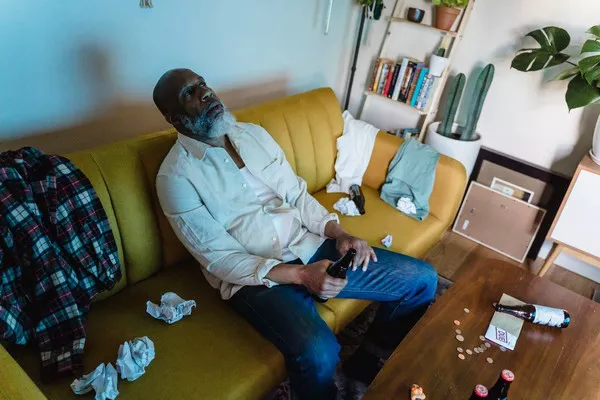The realm of love is a complex and multifaceted terrain, and when it comes to relationships with individuals who have bipolar disorder, there are unique challenges and considerations. Bipolar disorder, characterized by extreme mood swings between manic and depressive states, can indeed impact various aspects of an individual’s life, including their capacity for love. In this article, we explore the complexities of love in the context of bipolar disorder, specifically focusing on the question: Can a bipolar man fall in love?
Understanding Bipolar Disorder: The Rollercoaster of Emotions
Bipolar disorder is a mental health condition marked by dramatic shifts in mood, energy, and activity levels. Individuals with bipolar disorder experience episodes of mania, characterized by elevated and expansive moods, as well as episodes of depression, marked by low energy and persistent sadness. The oscillation between these extremes can pose unique challenges in the realm of love and relationships. Understanding the nature of bipolar disorder is essential in appreciating the complexities that may arise when a bipolar man navigates the terrain of falling in love.
Mania and Love: The Intense Highs
During manic episodes, individuals with bipolar disorder may experience heightened energy levels, increased impulsivity, and a sense of euphoria. In the context of love, this can manifest as intense passion, grandiose gestures, and an overwhelming desire for connection. A bipolar man in a manic state may fall in love quickly and passionately, expressing his emotions in a way that mirrors the intensity of his elevated mood. It’s crucial to recognize that these intense highs, while genuine, may be influenced by the manic phase of bipolar disorder, and the longevity and stability of these emotions may be subject to change.
Depression and Love: The Challenge of Emotional Lows
Conversely, the depressive episodes that individuals with bipolar disorder experience can present significant challenges in the realm of love. During these lows, a bipolar man may grapple with feelings of worthlessness, fatigue, and a pervasive sense of sadness. Navigating the complexities of love in such a state can be emotionally demanding for both the individual with bipolar disorder and their partner. The challenge lies in providing support and understanding during these difficult times, recognizing that the depressive phase is a facet of the disorder rather than a reflection of the individual’s capacity for love.
See Also: How quickly do moods change with bipolar?
Building Trust: A Crucial Component
Trust is a foundational element in any relationship, and this holds true for individuals with bipolar disorder. Building trust involves open communication, consistency, and understanding. Bipolar individuals may fear judgment or rejection due to the stigma surrounding mental health conditions. A bipolar man falling in love may struggle with disclosing his condition, fearing it may impact the perception of him as a potential partner. Establishing trust involves creating an environment where open conversations about mental health are encouraged, fostering a sense of acceptance and understanding.
Communication: Navigating the Highs and Lows
Effective communication is paramount in relationships involving bipolar disorder. A bipolar man falling in love needs to navigate the challenges posed by the oscillation between manic and depressive states. Establishing clear channels of communication allows for open discussions about mood fluctuations, treatment plans, and coping strategies. This transparent dialogue enables both partners to better understand and support each other through the highs and lows, fostering a sense of stability in the relationship.
Understanding Triggers and Warning Signs: A Collaborative Approach
Recognizing the triggers and warning signs of mood episodes is crucial for both the individual with bipolar disorder and their partner. A bipolar man falling in love may find it beneficial to collaborate with his partner in identifying potential triggers that could contribute to mood shifts. This collaborative approach empowers both individuals to proactively manage the impact of bipolar disorder on the relationship. By fostering an environment of mutual support and awareness, couples can work together to navigate the complexities of bipolar disorder within the context of their love.
Seeking Professional Support: A Vital Resource
The journey of love with a bipolar man may benefit from the involvement of mental health professionals. Therapists and counselors with experience in bipolar disorder can provide guidance on effective communication strategies, coping mechanisms, and relationship dynamics. Seeking professional support is not a sign of weakness but rather a proactive step towards building a strong foundation for a healthy and sustainable relationship. Professional intervention can equip both partners with the tools and insights needed to navigate the challenges that may arise in the context of bipolar disorder.
Medication and Treatment Compliance: Stabilizing the Journey
For many individuals with bipolar disorder, medication and treatment compliance play a pivotal role in stabilizing mood swings and mitigating the impact of the disorder on daily life. A bipolar man falling in love may find that adhering to a prescribed treatment plan enhances his overall well-being and contributes to the stability of the relationship. Encouraging and supporting medication compliance becomes a shared responsibility within the relationship, fostering an environment where both partners actively contribute to the individual’s mental health and the overall health of the relationship.
Educating Yourself: Empowering Love Through Knowledge
Education is a powerful tool in navigating relationships involving bipolar disorder. Both partners can benefit from educating themselves about the condition, its symptoms, and the available treatment options. Understanding the nuances of bipolar disorder equips partners with the knowledge needed to provide effective support, reduce stigma, and foster an environment of empathy and compassion. Knowledge empowers love, enabling partners to approach the complexities of bipolar disorder with awareness and understanding.
Patience and Flexibility: Nurturing Love’s Resilience
Patience and flexibility are virtues that hold particular significance in relationships with individuals experiencing bipolar disorder. The unpredictable nature of mood swings requires partners to adapt to changing circumstances with resilience. A bipolar man falling in love may appreciate a partner who approaches the relationship with patience, understanding that the journey may have its ups and downs. Flexibility in navigating the challenges of bipolar disorder contributes to the resilience of love, allowing the relationship to endure and thrive.
Support Networks: Enlisting Allies in Love’s Journey
In the context of love with a bipolar man, creating a robust support network becomes imperative. This network may include friends, family, and mental health professionals who can offer guidance and understanding. Partners of individuals with bipolar disorder may find solace and valuable insights in connecting with others who share similar experiences. Enlisting allies in love’s journey ensures that both individuals have access to the support and resources needed to navigate the complexities of bipolar disorder within the context of their relationship.
Self-Care for Both Partners: Sustaining Love’s Well-Being
Caring for one’s mental and emotional well-being is essential for both partners in a relationship involving bipolar disorder. A bipolar man falling in love and his partner should prioritize self-care practices that promote individual resilience and balance. This may involve engaging in activities that bring joy, seeking personal fulfillment, and maintaining a healthy lifestyle. By nurturing their own well-being, partners contribute to the overall health of the relationship, creating a foundation for love that can withstand the challenges posed by bipolar disorder.
Conclusion
Can a bipolar man fall in love? The answer is a resounding yes. However, the journey of love with a bipolar individual involves a unique set of considerations and challenges. Understanding the nature of bipolar disorder, fostering open communication, building trust, and seeking professional support are essential components of navigating the complexities of love in the context of bipolar disorder. By approaching the relationship with empathy, patience, and a commitment to mutual well-being, couples can build a foundation for enduring love that transcends the highs and lows of bipolar disorder.
Related topics:




























